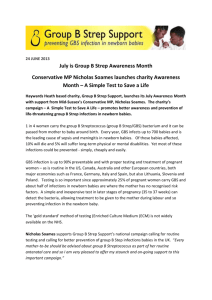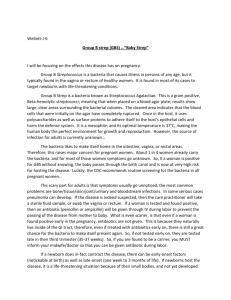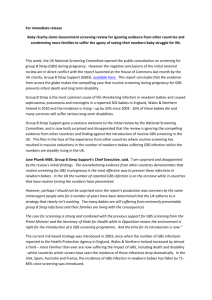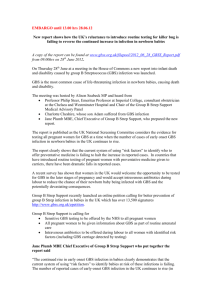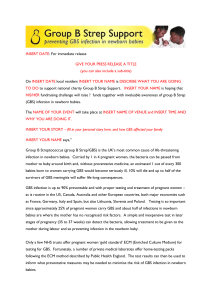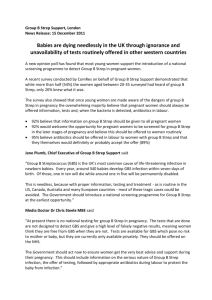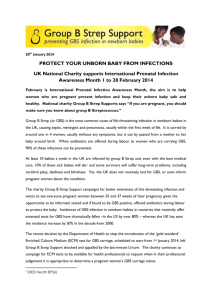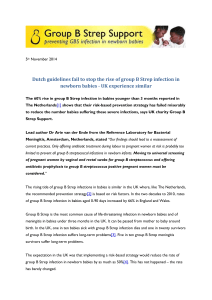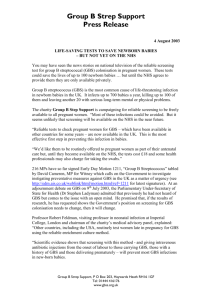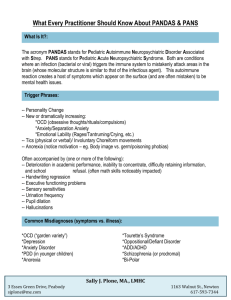MP`s, doctors and families petition Gordon Brown to protect babies
advertisement
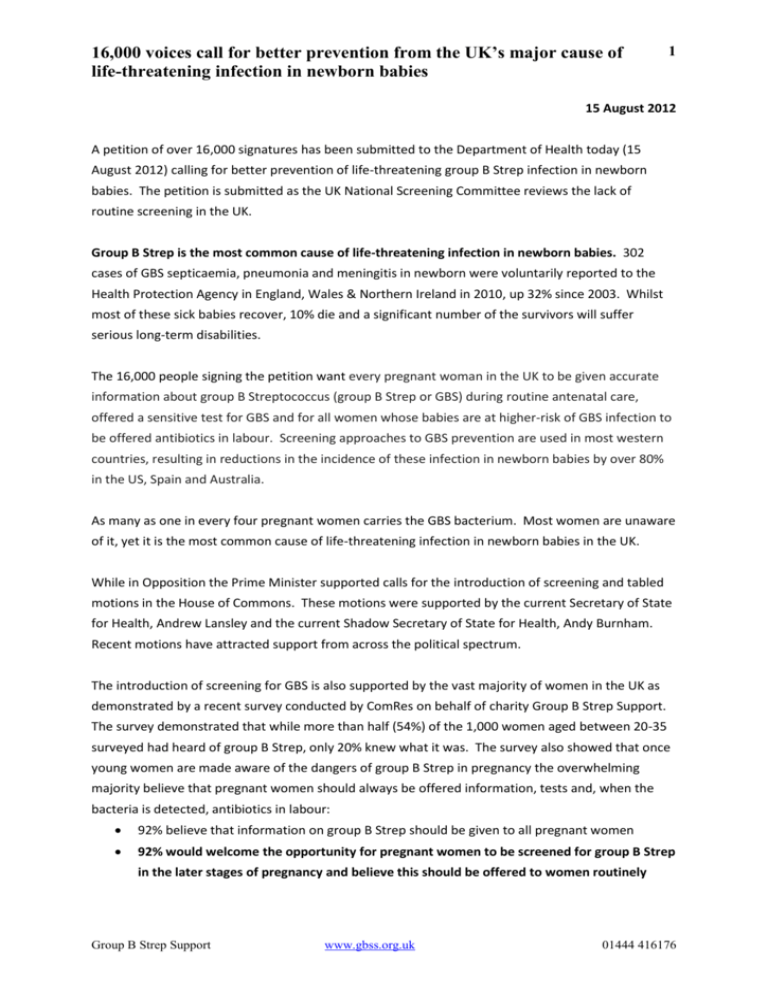
16,000 voices call for better prevention from the UK’s major cause of life-threatening infection in newborn babies 1 15 August 2012 A petition of over 16,000 signatures has been submitted to the Department of Health today (15 August 2012) calling for better prevention of life-threatening group B Strep infection in newborn babies. The petition is submitted as the UK National Screening Committee reviews the lack of routine screening in the UK. Group B Strep is the most common cause of life-threatening infection in newborn babies. 302 cases of GBS septicaemia, pneumonia and meningitis in newborn were voluntarily reported to the Health Protection Agency in England, Wales & Northern Ireland in 2010, up 32% since 2003. Whilst most of these sick babies recover, 10% die and a significant number of the survivors will suffer serious long-term disabilities. The 16,000 people signing the petition want every pregnant woman in the UK to be given accurate information about group B Streptococcus (group B Strep or GBS) during routine antenatal care, offered a sensitive test for GBS and for all women whose babies are at higher-risk of GBS infection to be offered antibiotics in labour. Screening approaches to GBS prevention are used in most western countries, resulting in reductions in the incidence of these infection in newborn babies by over 80% in the US, Spain and Australia. As many as one in every four pregnant women carries the GBS bacterium. Most women are unaware of it, yet it is the most common cause of life-threatening infection in newborn babies in the UK. While in Opposition the Prime Minister supported calls for the introduction of screening and tabled motions in the House of Commons. These motions were supported by the current Secretary of State for Health, Andrew Lansley and the current Shadow Secretary of State for Health, Andy Burnham. Recent motions have attracted support from across the political spectrum. The introduction of screening for GBS is also supported by the vast majority of women in the UK as demonstrated by a recent survey conducted by ComRes on behalf of charity Group B Strep Support. The survey demonstrated that while more than half (54%) of the 1,000 women aged between 20-35 surveyed had heard of group B Strep, only 20% knew what it was. The survey also showed that once young women are made aware of the dangers of group B Strep in pregnancy the overwhelming majority believe that pregnant women should always be offered information, tests and, when the bacteria is detected, antibiotics in labour: 92% believe that information on group B Strep should be given to all pregnant women 92% would welcome the opportunity for pregnant women to be screened for group B Strep in the later stages of pregnancy and believe this should be offered to women routinely Group B Strep Support www.gbss.org.uk 01444 416176 16,000 voices call for better prevention from the UK’s major cause of life-threatening infection in newborn babies 2 95% believe antibiotics should be offered in labour to women with group B Strep and that they themselves would definitely or probably accept the offer (89%) Jane Plumb, Chief Executive of Group B Strep Support said “Group B Streptococcus (GBS) is the UK’s most common cause of life-threatening infection in newborn babies. The financial and human costs of these infections are significant but preventable .However- whilst countries which screen have seen the incidence of these infections drop dramatically in the UK where there is no routine screening the rate of infection has increased. In the USA, Spain, Australia and France, the incidence of GBS infection in newborn babies has fallen by 71-86% since screening was introduced. Here, the numbers reported have increased by 32% since the Royal College of Obstetricians & Gynaecologists introduced their risk-based guidelines in 2003 – they’re simply not working. The case for GBS screening is strong. There is support for it from the public as this petition and the recent survey shows. The Prime Minister and the Secretary of State for Health, as well as the current Shadow Secretary of State for Health all supported this while on the backbenches and in Opposition. The time is right for the introduction of a GBS screening programme now.” Nicola Pilling, from Stoke on Trent, had daughter, Jessica, on 20 September 2010. Jessica was diagnosed with group B Strep meningitis aged one day. Nicola, from Stoke on Trent, said, “After a normal pregnancy, Jessica arrived safely two days after her due date. Yet within 24 hours she was in hospital – she had fits and stopped breathing. We were told she had meningitis. I was in complete shock. I asked the doctors if Jessica was going to die and their response was that we had a very poorly baby on our hands. The consultants told us that the next 24 hours were crucial and she needed to start responding to treatment. Our little fighter did just that. We remained in hospital for a week and were allowed home during the day, but back on the ward at night for the following week with the help of our Hospital at Home team. We endured regular visits to the Paediatric Outpatients’ Department and Jessica progressed well, meeting all of her developmental milestones. It was with huge relief and many tears that she was finally discharged – without any ill effects from the meningitis – at 17 months old. We feel like the luckiest people in the world and are so thankful to the staff at the hospital and our families for the help and support that they provided that helped us to get through such a devastating period of our lives. It is devastating to think that a simple test, late in pregnancy, with my having antibiotics in labour, could have saved all this heartache. I believe that routine screening for GBS should be introduced across the UK as soon as possible” Group B Strep Support www.gbss.org.uk 01444 416176 16,000 voices call for better prevention from the UK’s major cause of life-threatening infection in newborn babies 3 Media Doctor Dr Chris Steele MBE said “At present there is no national testing for group B Strep in pregnancy. The tests that are done in the NHS are not designed to detect GBS and give a high level of falsely negative results, meaning women think they are free from GBS when they are not. Tests are available for GBS which pose no risk to mother or baby, but they are currently only available privately. They should be offered on the NHS. The Government should act now to ensure women get the very best advice and support during their pregnancy. This should include information on the serious nature of Group B Strep infection, the offer of testing, followed by appropriate antibiotics during labour to protect the baby from infection.” For more information about group B Strep, please contact Group B Strep Support on 01444 416176 or visit www.gbss.org.uk. Ends Jane Plumb MBE, Chief Executive, Group B Strep Support for comment or to contact families affected by group B Strep. Case study photographs are available upon request, plus regional case studies. Tel: e-mail: Office email: Website: 01444 416176 jplumb@gbss.org.uk info@gbss.org.uk www.gbss.org.uk Notes to the Editor Group B Strep Support is a UK charity set up in 1996 to prevent GBS infection in newborn babies. GBS is a normal bacterium carried by up to 30% of adults. It can be passed from mother to baby around labour. This causes no problems for most babies: for others can be deadly, causing blood infection, pneumonia and meningitis. GBS is the most common cause of life threatening infection in newborn babies. In the England, Wales & Northern Ireland, the reported number of these infections has increased from 229 to 302 between 2003 and 2010 (an increase of 32%) and the rate per 1,000 live births has increased from 0.37 to 0.41 (an increase of 11%) since the introduction of the Royal College of Obstetricians & Gynaecologists’ 2003 prevention guidelines. These increases come at a time when a significant fall in GBS infections in newborn babies as a result of the Royal College of Obstetricians & Gynaecologists’ guidelines was expected. Data sourced from annual CDR/Health Protection Reports at Group B Strep Support www.gbss.org.uk 01444 416176 16,000 voices call for better prevention from the UK’s major cause of life-threatening infection in newborn babies 4 www.hpa.org.uk/Topics/InfectiousDiseases/InfectionsAZ/StreptococcalInfections/Epide miologicalData/ New report on preventable death and disability caused by group B Strep calls for routine screening as incidence continues to rise in newborn babies in the UK was launched by Group B Strep Support at House of Commons event on 28 June 2012. The report can be found at www.gbss.org.uk/filepool/2012_06_28_GBSS_Report.pdf . Newborn babies are at higher risk of developing GBS infection if there are certain ‘risk factors’ present during the pregnancy, labour and delivery. These are: Mum carrying GBS during the current pregnancy, Mum having a GBS urinary tract infection during the current pregnancy, a previous sibling having developed GBS infection, Mum’s waters breaking more than 18 hours before delivery, labour starting or waters breaking before 37 completed weeks of pregnancy and Mum having a fever in labour. ComRes interviewed 1,000 20-35 year old women in the UK online between 28th October and 1st November 2011. Data was weighted to be demographically representative of 2035 year old women in the UK. The full data tables are available at www.comres.co.uk. A few NHS trusts make sensitive testing for group B Strep available to pregnant women at the request of their health professionals, but most don’t. A number of private medical laboratories do – packs containing the necessary swabs are supplied free, with the postal service for carrying out the test costs around £35. See http://www.gbss.org.uk/test for the availability of sensitive testing following the Health Protection Agency’s BSOP58 from private laboratories. GBSS has no links/ receives no money from any laboratory. Group B Strep Support provides information and support to families and health professionals affected by GBS. It is the UK’s only charity dedicated to the prevention of group B Strep infection in newborn babies and provides comprehensive and reliable information on group B Strep, both printed and online. Group B Strep Support is supported by an independent medical advisory panel http://tinyurl.com/GBSS-MAP. Group B Strep Support www.gbss.org.uk 01444 416176
